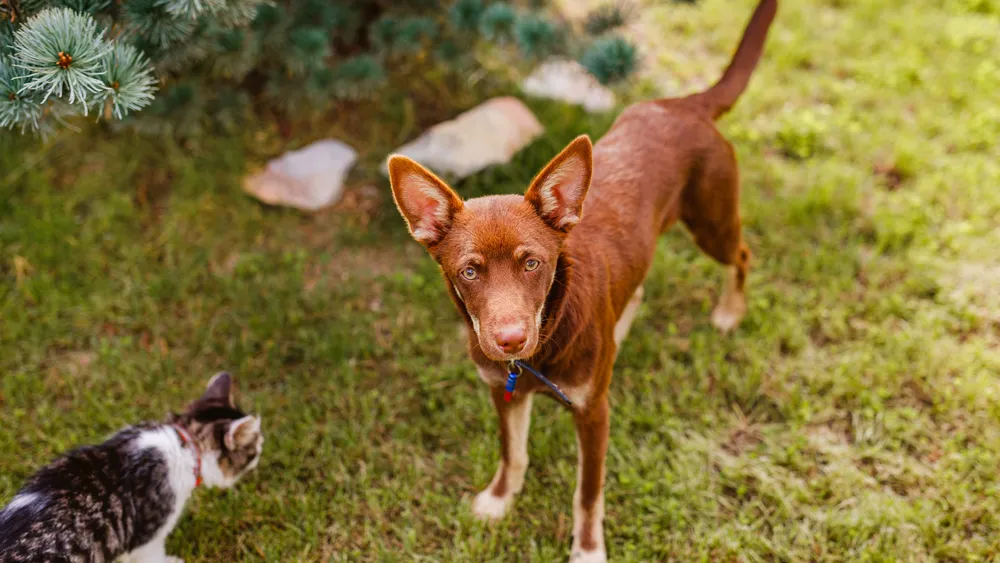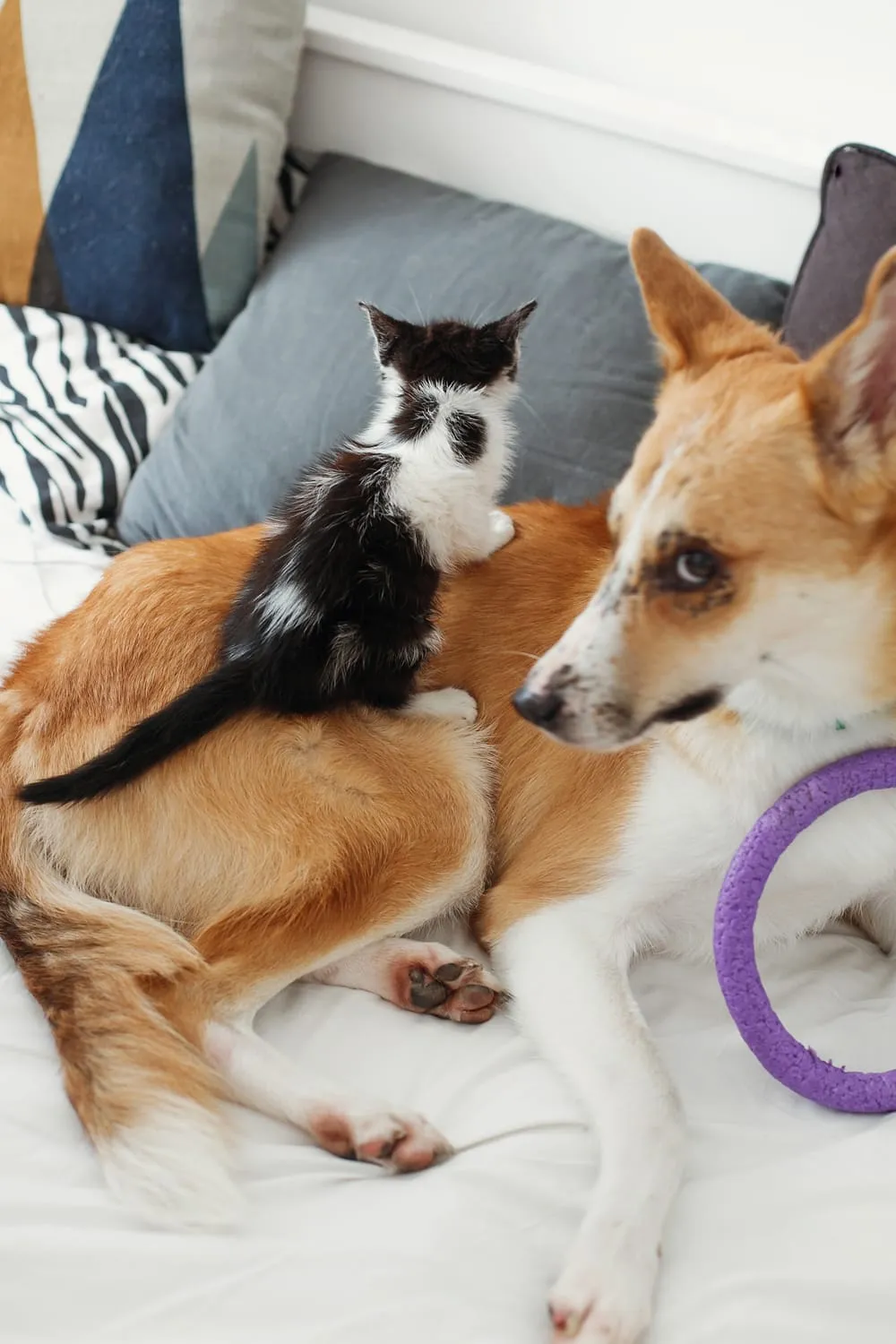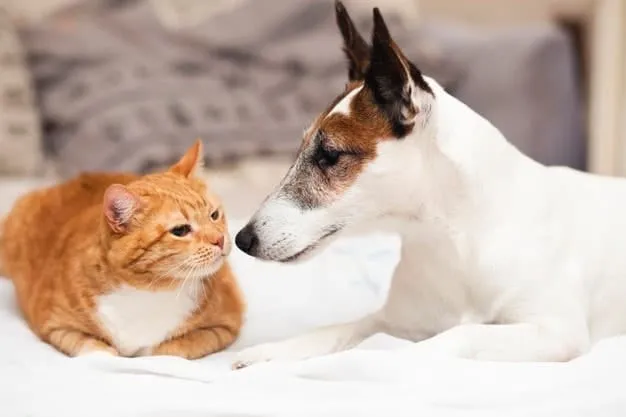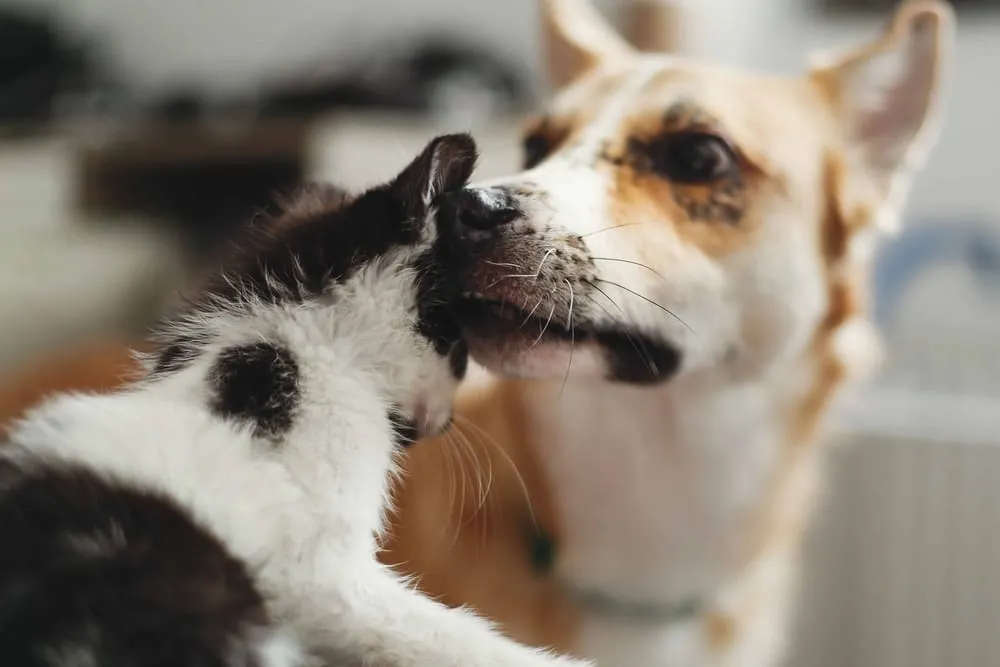Basenjis are known for their unique personality and independent nature. They are a breed of hunting dogs that originated in Africa and are often referred to as the "barkless dog" due to their unusual vocalizations. With their high energy levels and curious nature, many people wonder if basenjis are good with cats.

When it comes to basenjis and cats, the answer is not straightforward. While some basenjis may get along well with cats, others may have a strong prey drive and view cats as something to chase and hunt. It is important to note that a dog's temperament and behavior can vary based on their individual personality, upbringing, and training.
Owners who are considering getting a basenji and already have a cat should take precautions to ensure a safe and harmonious household. Proper introduction and socialization between the two pets is crucial, and it may be helpful to have supervision and training from a professional. Understanding the temperament and behavior of both the basenji and the cat can also help prevent any potential conflicts.
Understanding Basenji Temperament
Basenjis are a unique breed of dog with a distinct temperament. Understanding their temperament is essential for anyone considering adding one to their family, especially if they already have cats.

Independent Nature
Basenjis are known for their independent nature. They are not the type of dog that will constantly seek attention from their owners. Instead, they prefer to do their own thing and can be quite aloof at times. This independent nature can make them challenging to train, but it also means that they are less likely to suffer from separation anxiety.
Prey Drive and Hunting Instincts
Basenjis were originally bred in Africa for hunting purposes, and they still retain their strong prey drive and hunting instincts. They have a keen sense of smell and are excellent at tracking prey. This can make them a challenge to have around cats, as they may view them as prey. However, with proper training and socialization, they can learn to coexist peacefully with feline friends.
Vocalizations and Communication
Basenjis are known for their unique vocalizations, including a yodel-like sound that is often described as "barkless." They may also make a variety of other sounds, including growls, whines, and even screams. These vocalizations are an important part of their communication with their owners and other dogs. However, they can be a bit much for some people, especially if they live in close proximity to neighbors.
Basenjis have a unique temperament that can make them a challenge to own, especially if you have cats. However, with proper training and socialization, they can make excellent pets for the right owner. Their independent nature, prey drive, and vocalizations are all important factors to consider when deciding if a Basenji is the right dog for you.
Behavioral Traits of Basenjis With Cats
Basenjis are an ancient breed of hunting dogs that are known for their intelligence, independence, and strong prey drive. This has led many people to wonder whether or not they are good with cats. Here are some important behavioral traits to consider when introducing a Basenji to a cat.
Prey Drive Towards Cats
Basenjis have a strong prey drive, which means that they are instinctively inclined to chase and hunt small animals like cats. This does not necessarily mean that they will attack or harm a cat, but it does mean that they are more likely to be interested in chasing them than other breeds of dogs.
Socialization and Training
Socialization and training are key factors when introducing a Basenji to a cat. Early socialization is important to ensure that the Basenji is comfortable around cats and other animals. Training can also help to minimize the Basenji's prey drive and teach them to be calm around cats.
Basenji and Cat Body Language
Understanding the body language of both the Basenji and the cat is important when introducing them. A Basenji that is showing signs of excitement or arousal, such as raised hackles or a stiff tail, may be more likely to chase a cat. Similarly, a cat that is hissing or swatting may be indicating that they are uncomfortable and should be given space.
While Basenjis have a strong prey drive, they can coexist peacefully with cats with proper socialization and training. It is important to understand the body language of both the Basenji and the cat to ensure a safe and happy environment for both pets.
Preparing Your Basenji to Coexist with Cats
Introducing Basenjis to Cats
Introducing a Basenji to a cat requires patience and careful planning. It is important to introduce them gradually and in a controlled environment. The first step is to keep them separated and allow them to get used to each other's presence. This can be done by using a baby gate or a closed door to keep them apart.
Once they are comfortable with each other's presence, you can start to introduce them face to face. It is important to keep the initial meetings short and supervised. If the Basenji shows signs of stress or aggression, separate them immediately and try again later.
Creating a Safe Environment
Creating a safe environment for both the Basenji and the cat is crucial for their coexistence. Basenjis are known for their high prey drive, so it is important to keep the cat's litter box, food, and water in a separate area that the Basenji cannot access.
It is also important to provide the cat with a high place to escape to, such as a cat tree or a shelf. This will give the cat a safe place to retreat to if they feel threatened.
Ongoing Supervision and Management
Even after the Basenji and the cat have been introduced and are coexisting peacefully, it is important to continue supervising and managing their interactions. This means keeping them separated when unsupervised, and keeping a close eye on their interactions when they are together.
If any signs of aggression or stress are observed, it is important to separate them immediately and try again later. With patience and careful management, Basenjis and cats can coexist peacefully in the same household.

Training Techniques for a Harmonious Household
Basenjis are known to have a high prey drive, which may make it challenging to introduce them to cats. However, with proper training and socialization, it is possible to have a harmonious household with both cats and Basenjis. Here are some training techniques that can help achieve this:
Positive Reinforcement
Positive reinforcement is a training technique that rewards good behavior, rather than punishing bad behavior. This technique can be used to train Basenjis to get along with cats. When the Basenji exhibits good behavior around the cat, such as ignoring the cat or playing gently, they should be rewarded with treats, praise, or playtime. This reinforces the idea that good behavior is desirable and will result in positive outcomes.
Leash and Containment Training
Leash and containment training can be used to introduce the Basenji to the cat in a controlled environment. The Basenji can be put on a leash and allowed to approach the cat slowly while being rewarded for good behavior. If the Basenji becomes too excited or aggressive, they can be pulled back on the leash and redirected to a more appropriate behavior.
Similarly, containment training involves keeping the Basenji in a crate or behind a baby gate while allowing the cat to roam freely. This allows the Basenji to become accustomed to the cat's presence without being able to chase or harm them.
Addressing Aggression and Chase Behavior
If the Basenji exhibits aggression or chase behavior towards the cat, it is important to address this behavior immediately. This can be done by redirecting the Basenji's energy towards more appropriate activities, such as playing with toys or going for a walk. It may also be necessary to consult with a behaviorist to address any underlying issues that may be causing the behavior.
In addition to training techniques, it is important to ensure that the Basenji gets plenty of exercise and mental stimulation to help reduce their prey drive. Providing them with toys, puzzles, and regular exercise can help tire them out and reduce their desire to chase or harm the cat.
Overall, with patience, consistency, and the right training techniques, it is possible to have a harmonious household with both cats and Basenjis.
Health and Care Considerations
When it comes to owning a Basenji, it's important to consider their health and care needs. This breed is generally healthy, but there are a few things to keep in mind to ensure they remain happy and healthy throughout their lives.
Exercise and Mental Stimulation
Basenjis are a high-energy breed that require regular exercise to stay healthy and happy. They enjoy long walks, runs, and playing games like fetch. Mental stimulation is also important for this breed, as they can become bored easily. Providing puzzle toys and training sessions can help keep them mentally stimulated and prevent destructive behavior.

Grooming and Health Maintenance
Basenjis have a short, smooth coat that requires minimal grooming. Regular brushing and occasional baths are all that's needed to keep their coat healthy and shiny. It's also important to keep their nails trimmed and ears clean to prevent infections.
Regular visits to the vet are important for maintaining the health of your Basenji. They are generally a healthy breed, but can be prone to certain health problems such as hip dysplasia and progressive retinal atrophy. Keeping up with regular check-ups and vaccinations can help prevent these issues.
Diet and Feeding
Basenjis are a high-energy breed that require a nutrient-rich diet to maintain their health and energy levels. It's important to feed them a high-quality dog food that is appropriate for their age and activity level. Avoid overfeeding, as Basenjis can easily become overweight if they don't get enough exercise.
Owning a Basenji can be a rewarding experience, but it's important to consider their health and care needs. Regular exercise, mental stimulation, grooming, and a healthy diet are all important factors in maintaining the health and happiness of your Basenji. By providing them with the proper care, you can ensure they live a long and healthy life.
Choosing the Right Basenji
When it comes to getting a Basenji, selecting the right one is crucial. Here are some things to consider to help you choose the right Basenji for you.
Selecting a Basenji Breeder
One of the most important aspects of getting a Basenji is selecting the right breeder. A reputable breeder will ensure that the Basenji you get is healthy and well-socialized. Here are some things to look for in a Basenji breeder:
- Health testing: A good breeder will test their Basenjis for any genetic health issues that are common in the breed.
- Socialization: A breeder who socializes their Basenjis from an early age will help ensure that your Basenji is well-adjusted and friendly.
- References: Ask for references from previous customers to get an idea of the breeder's reputation.
- Contract: A reputable breeder will provide you with a contract that outlines the terms of the sale and any guarantees they offer.
Considering a Basenji Rescue
If you're considering getting an adult Basenji, a Basenji rescue group may be a good option. Here are some things to consider when looking for a Basenji rescue:
- Health and temperament: Ask the rescue group about the Basenji's health and temperament before adopting.
- Compatibility: If you have other pets, make sure the Basenji you're considering is good with other animals.
- Adoption process: Be prepared to go through an adoption process, which may include an application, home visit, and adoption fee.
No matter where you get your Basenji from, make sure you're prepared for the responsibility of owning a Basenji. They are a high-energy breed that requires plenty of exercise and mental stimulation. With the right preparation and care, a Basenji can make a wonderful companion.
The Basenji in Different Living Situations
Basenjis and Small Children
Basenjis are generally good with children, but they may not be the best fit for families with very young children. Basenjis have a high prey drive, and young children may unintentionally provoke them. Basenjis may also become jealous of the attention given to young children and may act out. It is important to supervise interactions between basenjis and young children and teach children how to properly interact with dogs.

Basenjis with Other Pets
Basenjis can be good with other pets, but early socialization is key. Basenjis have a strong prey drive, so it is important to introduce them to other pets at a young age to prevent any aggressive behavior towards them. They may also chase smaller pets such as rodents and birds, so it is important to supervise interactions between basenjis and these types of pets.
Basenjis in Apartments
Basenjis can adapt to apartment living, but they require daily exercise and mental stimulation. They are an active breed and need regular walks and playtime. Basenjis may also become vocal in an apartment setting, so it is important to train them to limit excessive barking. It is also important to note that basenjis should always be leashed when outside, as they have a strong prey drive and may chase after small animals.
Overall, basenjis can be good with cats and other pets with proper socialization and supervision. They can also adapt to apartment living with proper exercise and training.
Physical Characteristics and Breed Variations
Basenjis are a graceful and elegant breed that belong to the hound family. They are a hunting breed and were originally bred for hunting small game in Africa. Basenjis are known for their unique yodel-like bark and their independent and intelligent nature.
Coat Colors and Patterns
Basenjis come in a variety of colors and patterns, including red, black, and brindle. Their coat is short, fine, and shiny, and they have a wrinkled forehead and a curly tail. Basenjis are known for their cleanliness and grooming themselves like cats.
Size and Physicality
Basenjis are a medium-sized breed, with males standing at around 17 inches tall and weighing between 24-26 pounds, while females are slightly smaller, standing at around 16 inches tall and weighing between 22-24 pounds. They are agile and athletic, with a lean and muscular build.
Overall, basenjis can make great pets for those who are willing to put in the time and effort to train and socialize them properly. However, it is important to note that their hunting instincts may make them less compatible with small pets such as cats, and caution should be taken when introducing them to other animals.

Conclusion
In conclusion, the compatibility between Basenjis and cats is not a one-size-fits-all scenario. With understanding, patience, and proper introductions, many households successfully enjoy the company of both species. Responsible pet ownership involves addressing challenges promptly and ensuring a safe, loving environment for all furry family members.
FAQs: Common Concerns Addressed
- Can Basenjis live peacefully with cats?
- Yes, with proper introductions and supervision, many Basenjis coexist happily with cats.
- How do I introduce a Basenji to my cat?
- Gradual introductions and creating a positive environment are key. Start with scent exchanges and supervised interactions.
- What if my Basenji and cat don't get along?
- Identify the source of conflict, seek professional advice, and consider gradual reintroductions.
- Are Basenjis prone to chasing cats?
- Due to their prey drive, some Basenjis may chase cats. Training and positive reinforcement can help manage this behavior.
- Can I leave my Basenji and cat alone together?
- Gradually increase unsupervised time, but always ensure a safe environment and monitor their interactions.




